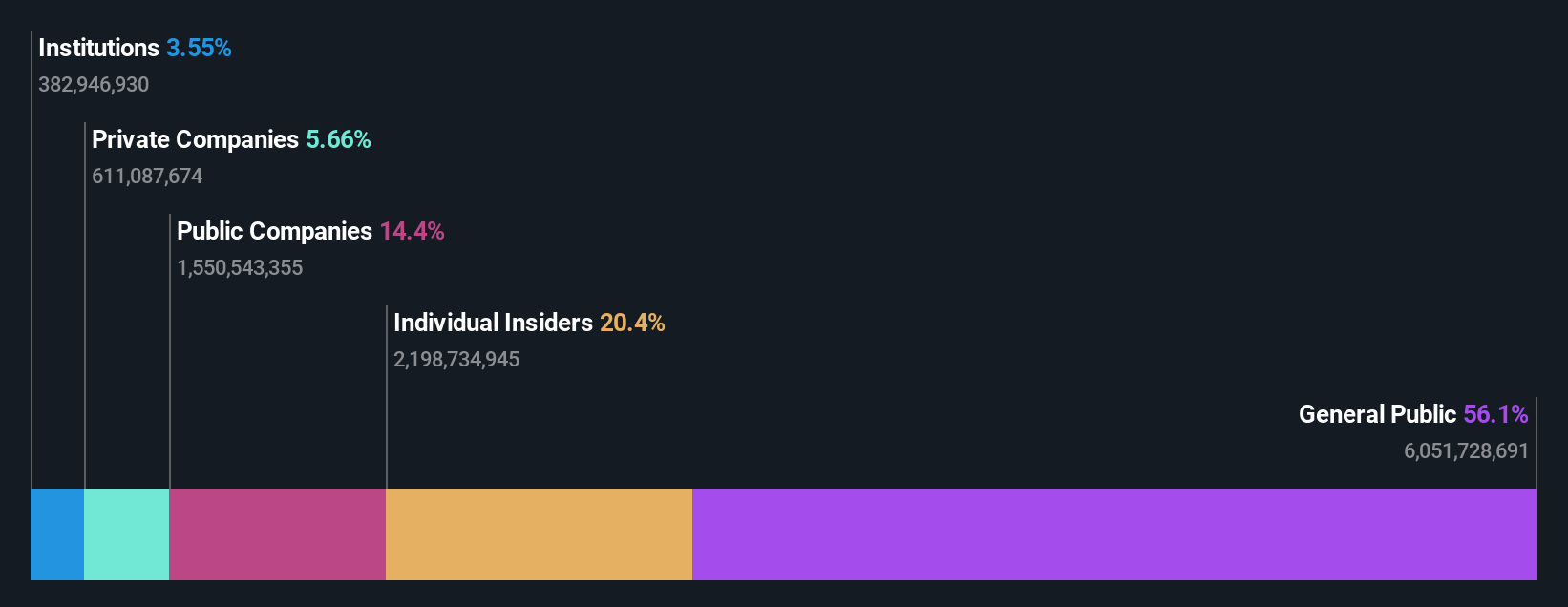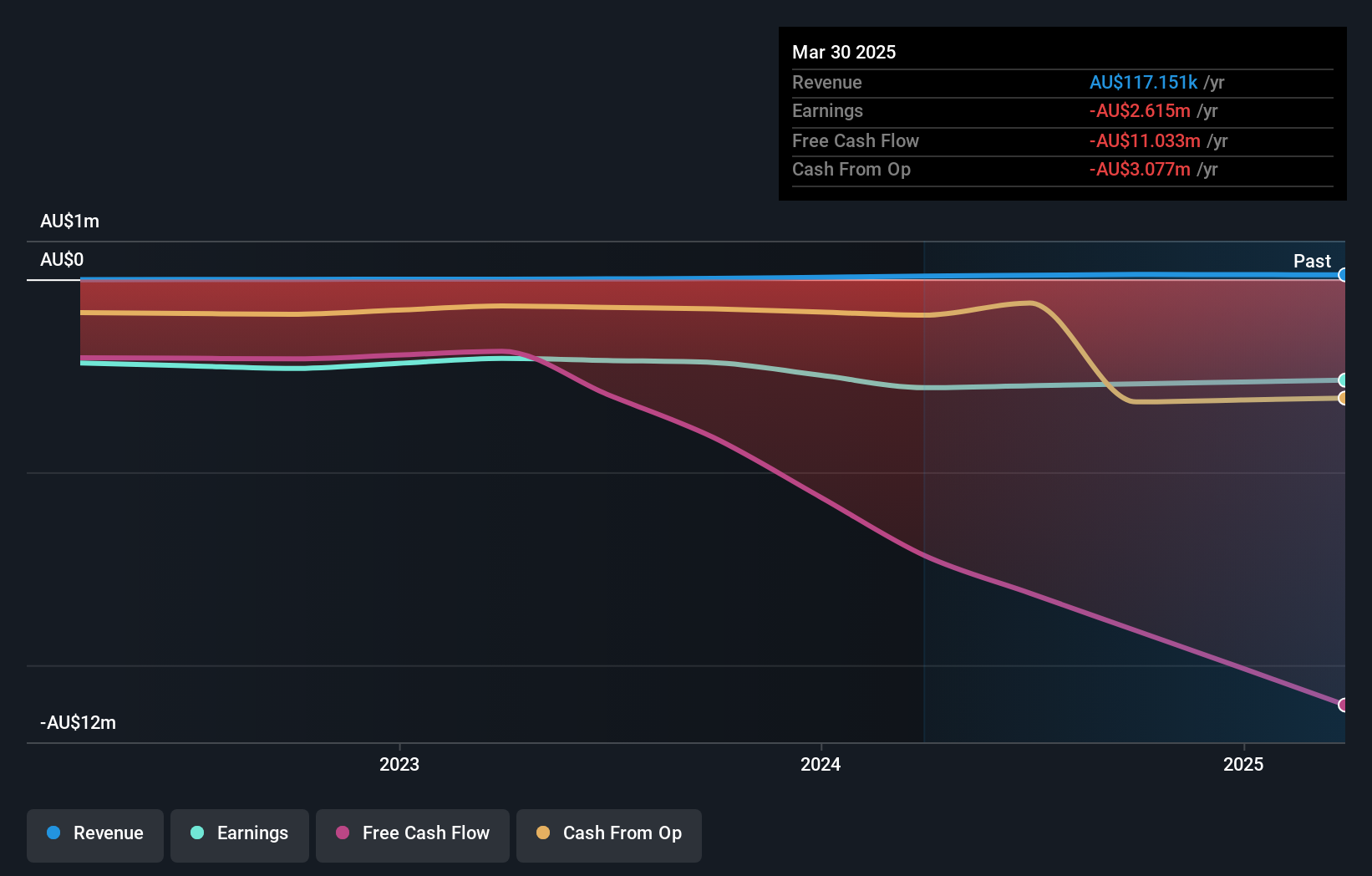- Australia
- /
- Metals and Mining
- /
- ASX:NMG
Individual investors invested in New Murchison Gold Limited (ASX:NMG) copped the brunt of last week's AU$43m market cap decline
Key Insights
- The considerable ownership by individual investors in New Murchison Gold indicates that they collectively have a greater say in management and business strategy
- A total of 21 investors have a majority stake in the company with 44% ownership
- Recent purchases by insiders
Every investor in New Murchison Gold Limited (ASX:NMG) should be aware of the most powerful shareholder groups. We can see that individual investors own the lion's share in the company with 56% ownership. In other words, the group stands to gain the most (or lose the most) from their investment into the company.
While insiders, who own 20% shares weren’t spared from last week’s AU$43m market cap drop, individual investors as a group suffered the maximum losses
Let's delve deeper into each type of owner of New Murchison Gold, beginning with the chart below.
See our latest analysis for New Murchison Gold

What Does The Institutional Ownership Tell Us About New Murchison Gold?
Many institutions measure their performance against an index that approximates the local market. So they usually pay more attention to companies that are included in major indices.
Less than 5% of New Murchison Gold is held by institutional investors. This suggests that some funds have the company in their sights, but many have not yet bought shares in it. If the business gets stronger from here, we could see a situation where more institutions are keen to buy. It is not uncommon to see a big share price rise if multiple institutional investors are trying to buy into a stock at the same time. So check out the historic earnings trajectory, below, but keep in mind it's the future that counts most.

Hedge funds don't have many shares in New Murchison Gold. Westgold Resources Limited is currently the largest shareholder, with 14% of shares outstanding. For context, the second largest shareholder holds about 5.7% of the shares outstanding, followed by an ownership of 3.5% by the third-largest shareholder. Additionally, the company's CEO Alexander Passmore directly holds 1.8% of the total shares outstanding.
On studying our ownership data, we found that 21 of the top shareholders collectively own less than 50% of the share register, implying that no single individual has a majority interest.
While studying institutional ownership for a company can add value to your research, it is also a good practice to research analyst recommendations to get a deeper understand of a stock's expected performance. As far as we can tell there isn't analyst coverage of the company, so it is probably flying under the radar.
Insider Ownership Of New Murchison Gold
The definition of company insiders can be subjective and does vary between jurisdictions. Our data reflects individual insiders, capturing board members at the very least. Management ultimately answers to the board. However, it is not uncommon for managers to be executive board members, especially if they are a founder or the CEO.
Insider ownership is positive when it signals leadership are thinking like the true owners of the company. However, high insider ownership can also give immense power to a small group within the company. This can be negative in some circumstances.
Our most recent data indicates that insiders own a reasonable proportion of New Murchison Gold Limited. Insiders have a AU$59m stake in this AU$291m business. We would say this shows alignment with shareholders, but it is worth noting that the company is still quite small; some insiders may have founded the business. You can click here to see if those insiders have been buying or selling.
General Public Ownership
The general public, mostly comprising of individual investors, collectively holds 56% of New Murchison Gold shares. This size of ownership gives investors from the general public some collective power. They can and probably do influence decisions on executive compensation, dividend policies and proposed business acquisitions.
Private Company Ownership
Our data indicates that Private Companies hold 5.7%, of the company's shares. It's hard to draw any conclusions from this fact alone, so its worth looking into who owns those private companies. Sometimes insiders or other related parties have an interest in shares in a public company through a separate private company.
Public Company Ownership
It appears to us that public companies own 14% of New Murchison Gold. This may be a strategic interest and the two companies may have related business interests. It could be that they have de-merged. This holding is probably worth investigating further.
Next Steps:
While it is well worth considering the different groups that own a company, there are other factors that are even more important. Take risks for example - New Murchison Gold has 2 warning signs we think you should be aware of.
Of course this may not be the best stock to buy. Therefore, you may wish to see our free collection of interesting prospects boasting favorable financials.
NB: Figures in this article are calculated using data from the last twelve months, which refer to the 12-month period ending on the last date of the month the financial statement is dated. This may not be consistent with full year annual report figures.
Valuation is complex, but we're here to simplify it.
Discover if New Murchison Gold might be undervalued or overvalued with our detailed analysis, featuring fair value estimates, potential risks, dividends, insider trades, and its financial condition.
Access Free AnalysisHave feedback on this article? Concerned about the content? Get in touch with us directly. Alternatively, email editorial-team (at) simplywallst.com.
This article by Simply Wall St is general in nature. We provide commentary based on historical data and analyst forecasts only using an unbiased methodology and our articles are not intended to be financial advice. It does not constitute a recommendation to buy or sell any stock, and does not take account of your objectives, or your financial situation. We aim to bring you long-term focused analysis driven by fundamental data. Note that our analysis may not factor in the latest price-sensitive company announcements or qualitative material. Simply Wall St has no position in any stocks mentioned.
About ASX:NMG
New Murchison Gold
Engages in the mineral exploration activities in Australia.
Flawless balance sheet with very low risk.
Market Insights
Community Narratives



